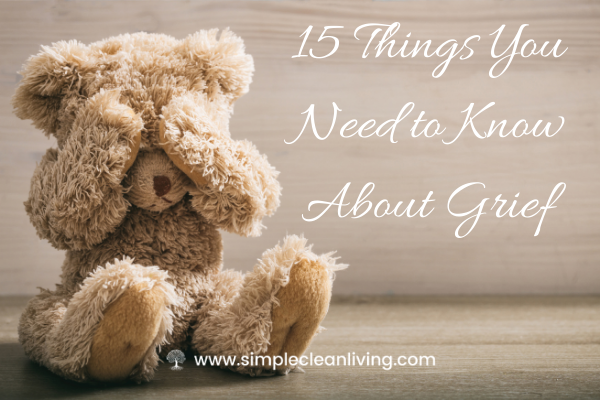Notice: I’m an affiliate for Amazon as well as other companies. Any links in this article may be affiliate links. I always appreciate it if you purchase something using my affiliate links. Doing so helps me to raise a little extra money that pays for the costs of running this site. And it allows me to continue bringing you quality content, all without costing you a thing! Thanks!
I originally wrote this post about grief back in August 2014 after the death of my mother. I’ve decided to update it after experiencing the death of my father, with some additional information.
Losing a loved one through death is one of the most stressful things that you can endure in life, and with good reason. Your life completely changes in an instant. Even if your loved one was sick for an extended period before they passed. And there is a lot of information about what to expect with the grieving process that you can find online or through a therapist.
But there are some things that you may encounter that are not only unexpected but seems a little strange as you move through the grieving process. I discovered some of these strange things after losing my Mom three weeks ago, and as I talked with others about their experiences I noticed a pattern that the “experts” haven’t really talked about.
Your body is being impacted!
This really is the 16th thing that you need to know. But it’s something that I’m adding after the death of my Dad. I experienced a LOT more physical symptoms as a result of my grief this time. Of course, the death of a loved one is very stressful. And the world has been dealing with an extended period of stress as the result of a global pandemic.
Some of the common physical issues that occur when grieving:
- Heart problems- the high level of stress associated with grieving can cause a heart attack, heart palpitations, and other heart issues. If you experience symptoms, go and see a doctor!
- Digestive issues- stress is the number one cause of digestive upset, so it’s no surprise that grieving may cause some tummy troubles.
- Lowered immunity- stress also lowers the immune system, so it’s important to make sure you are getting plenty of rest and eating well to help you stay healthy!
- Body aches and pains- I had this problem pretty badly after my Dad passed away. Holding stress in the body without being aware of it can cause physical pain.
- Fatigue- Grief can cause fatigue. The kind that causes you to have trouble getting out of bed, or feeling like you can barely keep your eyes open during the day. This is particularly a problem in the weeks directly after the death of a loved one. As time progresses, you should find the fatigue lessening. This was also a big problem for me after my father passed. I took time and listened to my body. I took naps frequently…especially during the first week after his death. Listen to your body and rest when you need to!
- Unhealthy ways of coping- it’s easy to turn to food, cigarettes, alcohol, or other unhealthy things to cope with the stress of the death of a loved one. If you find yourself struggling with an unhealthy pattern or an addiction as the result of a death, contact a mental health professional who can help.
Besides the physical effects of grief, here are a few other things you need to know.
15 things you need to know about grief
It’s okay to laugh
There are going to be times when you want to laugh and it is okay to laugh! After my Mom passed, the family relieved a lot of stress by sharing funny stories of family vacations, or things that we did with Mom. A really good, hard belly laugh is incredibly stress relieving and can be a great way to celebrate the life of your loved one as well. It is a healthy part of the grieving process to laugh. Some people may be afraid that it’s inappropriate to laugh when they should be grieving, but the body does relieve stress through both laughter and tears. We had family members who felt that it was inappropriate for us to laugh at my Mom’s visitation, but my Mom wouldn’t have had it any other way!
Your emotions will be like a roller coaster
Some days or even moments in the day you will feel perfectly fine, but other days and moments you will feel down and depressed. You never know when those down moments are going to be, but just let yourself cry if you need to! I learned to always have tissues with me either in my purse or pocket because I never really knew when I was going to need them.
There will be a lot of food
People don’t know what to do for you when you are grieving, so they will try to feed you (and this is even worse in the Southern US where people try to feed you for every occasion!). People that care about you genuinely want to help, but because they don’t often know how to react to someone who is grieving, they want to help by bringing a meal.
This was really helpful for my family during the days of the memorial services for my Mom, especially since we had family in from out of town, but there were so many people that offered meals that had we not communicated our meal needs, we would’ve had far more food than we would’ve known what to do with. It is okay to say no to a meal if you don’t need it! Don’t be afraid to communicate with people and let them know if you need a meal or not.
Random things will trigger your grief
Obscure and random things bring out memories of your loved ones that will leave you boohooing. And I am not kidding about this! I have a bottle of a supplement that my Mom gave me and when I opened the cupboard and saw it, I broke down sobbing and was a hot mess. And yet I can see a picture of my Mom’s grave site and not get emotional at all. It is absolutely the small, random memories that will hit you like a ton of bricks. And it can and WILL happen in public at some time. Once again, it is okay to cry!
“Please let me know if there is something I can do.”
A lot of people will say to you “Please let me know if you need anything” or “Let me know if there is something I can do”. The overwhelming majority of them don’t really mean it….but don’t take that personally! There seems to be an unwritten list of things that people say to those who are grieving and those two things are at the top of the list. People just don’t really know what to say and it’s their way of trying to let you know that they care.
You will know the ones that do mean it and they can be a great help in the first few weeks after the death of your loved one. Here’s an example for you. My Dad has a lawn company that he calls to schedule lawn mowing. Because of my Mom passing, he didn’t have a chance to call them, but one of the members of my Dad’s church came and mowed the lawn for him so that he didn’t have to worry about it looking bad with all of the visitors stopping by. That was a person who actually meant it!
You forget they are gone
You will have moments when you forget that your loved one has actually passed. I am still having moments when I think “I need to call Mom….” and then I remember that I can’t. That happens pretty much to everyone as they are grieving and dealing with establishing a new “normal”.
Good intentions
As you begin to get back into your daily routine, every time you see someone who hasn’t seen you since your loss, they will look at you with sad eyes and quietly ask “So how are you doing”. When you’ve been in that position, you will know the look and the tone that they use when they ask it…..and you will hate that question with a passion! As someone that is currently going through this phase of the grieving process, let me say this. Those of us who are grieving know that the people asking the question really do care about us. But it can be emotionally overwhelming to be asked it day after day, particularly when answering brings forward so many raw emotions at a time that we are desperately trying to find some sense of normal again.
Withdrawing
There will be a time that even the most extroverted person will want to withdraw from people to be alone for a bit. This could be anywhere from a few hours to a few days. We all seem to need this time to process our own emotions, grieve some in private, and avoid questions like the one in #7 above. It’s okay to withdraw for a bit…as long as you don’t completely withdraw from everyone and everything. Doing that could be a sign that your grief is actually becoming depression and you should get some help for that!
The whirlwind
Often, the time right after the passing of your loved one through the memorial service does not seem real. I know that this was true for my family, and I have talked with others who have described it as a whirlwind and many who have said that they don’t even remember the funeral service. Everything about that time seemed completely surreal and like I was watching a movie when I went through it. We definitely shed plenty of tears during that time, but we did not truly begin grieving until we started getting back into a daily routine. It wasn’t until that time that the weight of the loss fully kicked in.
Moments of loneliness
You can feel lonely, even in a room full of people. This is particularly true for those who lose a spouse or partner. I have heard my Dad mention numerous times how lonely he feels. That is part of his grieving process and beginning his life without his wife of 49 years.
The world moves on
Life does continue to go on…even though your world may feel like the walls have caved in. The bills still need to be paid and the rest of the world continues to move forward, seemingly oblivious to the huge change you have experienced in your life.
Memory problems
Your brain goes on hiatus for a while after your loss. Seriously people! I am one who normally has a pretty darn good memory and I have been having a heck of a time remembering diddly squat! I have read that this is a normal response to grief and loss….but it is one of the parts of the process that is driving me nuts!
Disappearing people
Some people will disappear. I’ve mentioned it before, but people are REALLY uncomfortable with death. They do not like to talk about it, they don’t know how to deal with the grieving and it makes them think about their own mortality. So after the funeral, some people will disappear from your life. Some permanently and some temporarily. They just don’t know how to deal with your loss, and so they avoid it altogether.
Feeling crazy
You will have moments when you feel you are going crazy. It is normal to feel this way because pretty much everyone who goes through the grieving process feels this way at some point. The good news is that you are NOT going crazy….you’re just grieving! That feeling will pass soon enough.
To grieve…or not to grieve?
You believe in heaven and eternal life, so you shouldn’t grieve. Yep folks, I did encounter this one. And I know absolutely that I will see my Mother again one day. But that does not mean that I won’t miss her here, because I will, and I do…every. single. day!
There are some things that you can do to reduce stress and look out for yourself during this time.
Don’t let anyone tell you how long you should grieve!
Every person is different and we all grieve on different schedules! So if someone says to you “You should be over it by now”, don’t even listen to them! And you do have a right to tell them to go and take a long walk off of a short dock! I actually experienced this with the death of my mom. I had someone in my life who expected that I should just “be fine” and get back to life as normal. That was their expectation, but not my reality. Honor your grief and however long it takes you.
Don’t let anyone tell you how you should grieve!
Laugh, cry, have a pillow fight! You will grieve your loss in your own terms…and that is okay! I always loved finding the laughter in the memories. And I expressed my grief through writing and other creative outlets. That doesn’t mean I didn’t cry. I did…plenty. But creativity was how I was able to express that grief. Not everyone may be comfortable with how you express your grief, and that’s okay.
Don’t pressure yourself to do too much too soon!
A lot of people will tell you to stay busy…but this is not always the best plan of action. Listen to yourself and to what you need during this time. I gradually got back into my full schedule which worked for me. My Dad went right back to a full work schedule and that worked for him. Do what works for YOU!
LET YOURSELF CRY!
It doesn’t have to be in public or even around anyone else at home. But don’t hold in that grief. It is very damaging to your health to hold in those tears. It is much more healing to let them out. Does grief feel good? Heck no! But holding it in feels even worse in the long run and can lead to a whole host of chronic illnesses! Crying does not make you weak! And crying can be very therapeutic! So release those tears to let go of some of that energy. It will help you to feel better!
Make sure you are getting enough sleep!
I know from personal experience that this can be challenging some nights. But sleep is important, especially if you want to stay healthy through the grieving process. If you find yourself struggling with sleep, then add some Angstrom Magnesium. This one mineral really helped me, my Dad, and my sister to sleep so much better! There are also some good herbs that can help promote sleep. Herbs such as Passionflower, Valerian, Ashwagandha, Tulsi, Lemon Balm, and St. John’s Wort all help to reduce stress and may help you to fall asleep. I love Ashwagandha and Tulsi because they help the body handle stress better. I take both regularly when stress is high in my life. I take Ashwagandha in supplement form and drink Tulsi tea (which I find very tasty).
Make sure you are getting good, healthy food.
Now, I will say that we did not eat the best over the past month, especially since we had to fly up to Michigan for a week for Mom’s graveside service. But boy, we all felt sick from the amount of time that we ate out! It was just gross! The whole family went back to eating real food once we got home and it really makes a difference! When you can, get a real food meal in you! That will help you to stay physically healthy during this tough time.
If possible, don’t make any big life-changing decisions during this time.
Many people are just not mentally and emotionally in the best place to make really big decisions during this time, and that’s okay. Losing a loved one is one of the most stressful life events you can face. And high levels of stress impact your cognitive function. This means that it can be more challenging for you to make the best decisions. So unless you absolutely must make a big decision, give yourself six to twelve months to grieve first.
If you are struggling, find a grief support group.
You can find these groups through hospice, your local hospitals, or local churches. Being in a group of others who are going through what you are and who have an idea of what you are feeling can be really helpful!
Do your best each day and know that you will be okay.




